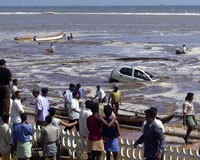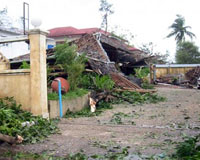British woman beats the Burmese junta
by - 28th July 2008
 The world is already forgetting Cyclone Nargis which rampaged through southern Burma, killing more than 100,000 people in May, and leaving two million homeless, writes Lynda Peel.*
The world is already forgetting Cyclone Nargis which rampaged through southern Burma, killing more than 100,000 people in May, and leaving two million homeless, writes Lynda Peel.*
The military junta denied access to the UN and international rescue teams waiting on their doorsteps and commandeered the aid for themselves.
But the ordinary citizens of Rangoon have not forgotten; in a spirit reminiscent of Dunkirk, they are responding to the dire needs of their countrymen in the delta area; they collect from anyone who will give, they use their own meagre savings, they sell their few possessions, so enabling them to buy essential commodities.
They travel by local bus and small boats, often in hazardous conditions, to reach the almost unreachable, all the time carefully avoiding contact with the military authorities who are more than likely to confiscate their precious cargo. And at the forefront of this movement are the Christians.
My plans to visit in June were already in place; I had received a good number of gifts for my ongoing work, but suddenly people began to ask whether I would be able to get money in, where the big organisations had failed; by the time I was ready to leave, I had £10,000 available, almost three times my normal budget; a colleague working alongside me had a further £5000.
Together we gathered our local contacts - more than a dozen Christian leaders from many parts of the city of various denominational backgrounds.
All had themselves suffered the effects of the cyclone; most had outreach works in even poorer areas, whose fragile buildings had been totally flattened. They were already doing everything they could within their communities - some had been to the delta, giving everything they could possibly spare.
They responded with one heart to the challenge of reaching out further. Within just a few days, we had between us sent seven teams into the delta area. They returned with reports of real hands-on help for the neediest.
We had handed over the money and trusted them to pray about how to use it best; they bought rice, clothes, candles, mosquito nets, building materials; one group (who had already spent all they had on previous trips), even bought a mechanical plough to replace the bullocks drowned in the floods.
 In every case, they said their help had only scratched the surface. Another group who had spent ten hours in a boat, partly on the open sea, said they only had enough candles to give one per household. Villagers from four neighbouring areas had turned up on hearing of their arrival.
In every case, they said their help had only scratched the surface. Another group who had spent ten hours in a boat, partly on the open sea, said they only had enough candles to give one per household. Villagers from four neighbouring areas had turned up on hearing of their arrival.
They reported that 782 out of 813 homes had been destroyed and 135 people had died; that most survivors were inadequately clothed and without basic cooking utensils and mosquito nets, and that the area was infested with poisonous snakes. Yet government ‘aid workers’ had already been and gone.
I used my last £500 to finance a second trip for this latter group, but had to disappoint everyone else; other Christians who had already exhausted their own resources also approached me for help but there was nothing more I could do.
To be really effective, our people need to return again, and even then it will still be a drop in the ocean. Had the UN and other international groups been able to get in, our contribution would have been 'the icing on the cake.' Instead, we were the only help there was. And it’s still desperately needed.
Some of our resources went to the poor areas around Yangon - both the shanty towns on the outskirts, and the villages south of the river. Again we put the responsibility on our people on the ground to pray about how best to help their local communities. As a result we fed the desperately hungry, distributed clothes, candles and other basics, and repaired more than one hundred houses. And we enrolled more than thirty children for their new school year - the cyclone meant their parents had not been able to pay admission fees.
Our people gave indiscriminately to Christians and Buddhists alike, with no strings attached. One of our pastors was told: ‘Our rich neighbours aren't interested in helping, but you poor Christians really care about us.’
* For security reasons this is a pseudonym. Lynda was an associate member of the international charity Interserve in Kathmandu from 1989 to 1994. She has been in and out of Burma fifteen times since 1999 and was also there when the monks marched.
- Log in to post comments
